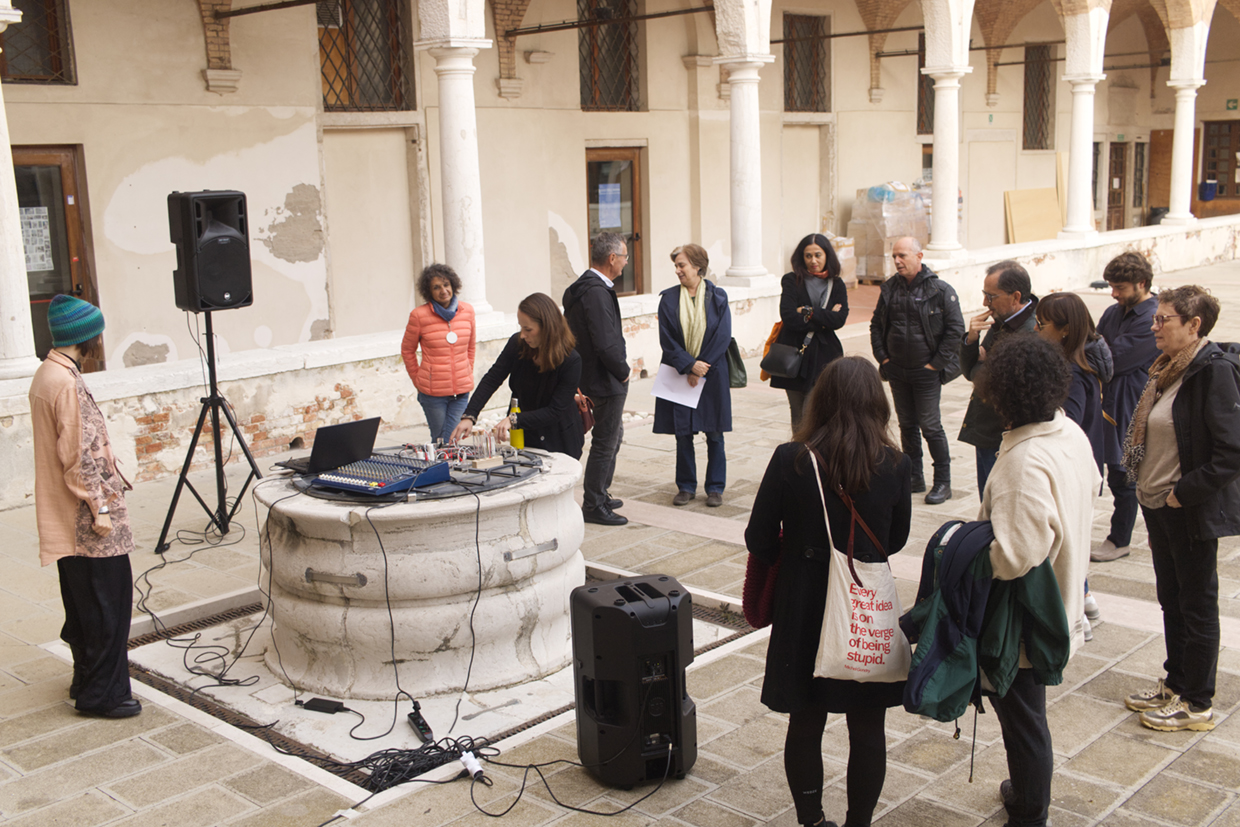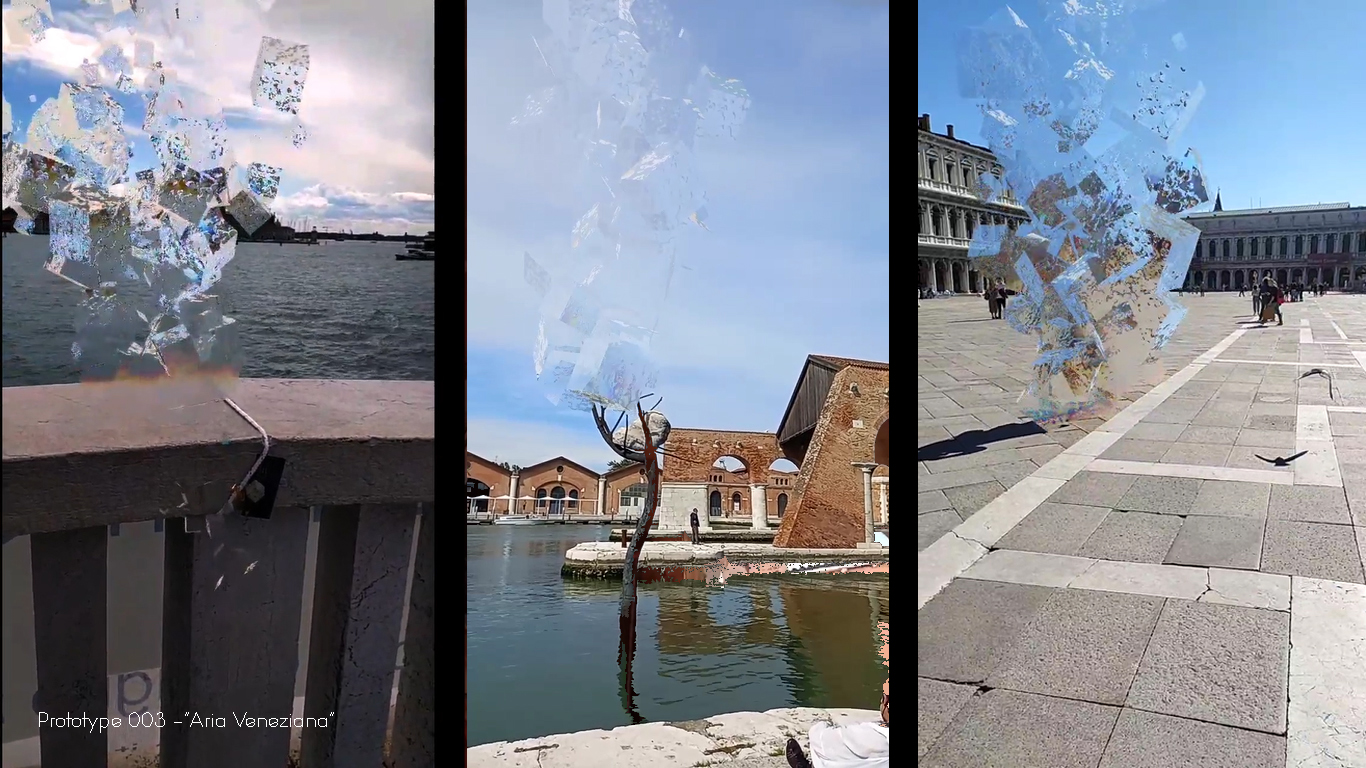Climate Change Pavilion
Venice Climate Change Pavilion
(
Philanthropic organization
)
#OceanAction46172
Description
The idea of a diffused Pavilion, that collects stories and data from local scales to then bridging it on a global scale, relies on the urgency of new narratives to accelerate the process of adaptation and mitigation towards the climate and biodiversity crisis: we are all connected by water ecologies, the ecological problems are a shared path that involves us all as citizen and human beings.
To make a paradigm shift, it is needed to wave and create narratives where we can feel and experience the knowledge that we hold. We can interpret and understand our being in the world as citizen and as human being by analyzing a single sample of water collected in different part of the sea, and approach it like a poem: de-layering and de-territorialize (Deleuze,Guattari) data makes a new cartography and new geographies possible.
The sea is a key of interpretation that holds up the major challenges of the future: rising sea level, rising global temperature, CO2 cycle of absorption, microplastics pollution, biodiversity loss, acidification of Ph, alteration of specimens (alien species).
The project aims to translate the data that are gonna be collected during the journey across different bodies of water to by making them experienceable, embodied for a wider public. By making them accessible, and creating new narratives, the pavilion aims to explore horizontal ways of data physicalization for public engagement, in order to operate a cultural and spatial regeneration.
Venice Climate Change Pavilion is a project at the intersection of art and science, ecology and research.
It is a urban diffused pavilion that shows climate change data in the Venice Lagoon //Uses Ephemeral Practices and Transdisciplinary Ecologies for Ocean&Lagoon Literacy //Weathering ArtScience for the amphibian future, connecting citizens and research embodying knowledge in a transdisciplinary way.
The goal of the project is to be an innovative tool to raise awareness about climate change emergencies in frale ecosystems such as the Venetian Lagoon. Since data (environmental,social,scientific..) are the new layer of our cities,they are a fundamental matter to work with, that brings awareness of the place we live in. When we sense that we belong to a place, we commit to its beauty, to its better future. The project is born to raise awareness, because from awareness comes the sense of belonging,and from this starts the change towards a future where the saveguard of beauty is linked to a healthy environment, non-polluting cities and carbon zero emissions.
Youth4Ocean Forum
Local Partners:
-VeniceCalls
-Tocia!
-DoppioFondo
-Opificio
-Etifor (IT)
EU:
-EU4Ocean (EU)
-Youth4Ocean Forum (EU)
-TALK C.E.C
GLOBAL:
-Thalassophile Project
-Oceanum_Madeira
-XRE Extended Reality Ensemble (NY/USA)
The project started in May 2021, Awarded as part of EU Maritime Forum YOUTH4OCEAN “Arts and Culture relating to the Ocean Literacy” EU4Ocean Award 2022, VCCP raised as a spontaneous answer to the theme of Venice’s Architecture Biennale 2021 How will we live together?, beginning from the awareness of the hidden climate data we live within and an analysis of the Critical Zones and the fragile ecosystems of the Venetian Lagoon. The Pavilion
is actively involved and flag bearer in knowledge sharing and SDG 13 and 14 as part of UN SDG, in order to actively leave a positive impact/trace on a cultural, ecological and urban level.
SDGS & Targets
Goal 13
Take urgent action to combat climate change and its impacts
13.1
Strengthen resilience and adaptive capacity to climate-related hazards and natural disasters in all countries
13.1.1
Number of deaths, missing persons and directly affected persons attributed to disasters per 100,000 population
13.1.2
Number of countries that adopt and implement national disaster risk reduction strategies in line with the Sendai Framework for Disaster Risk Reduction 2015–2030
13.1.3
Proportion of local governments that adopt and implement local disaster risk reduction strategies in line with national disaster risk reduction strategies
13.2
Integrate climate change measures into national policies, strategies and planning
13.2.1
Number of countries with nationally determined contributions, long-term strategies, national adaptation plans and adaptation communications, as reported to the secretariat of the United Nations Framework Convention on Climate Change
13.2.2
Total greenhouse gas emissions per year
13.3
Improve education, awareness-raising and human and institutional capacity on climate change mitigation, adaptation, impact reduction and early warning
13.3.1
Extent to which (i) global citizenship education and (ii) education for sustainable development are mainstreamed in (a) national education policies; (b) curricula; (c) teacher education; and (d) student assessment
13.a
Implement the commitment undertaken by developed-country parties to the United Nations Framework Convention on Climate Change to a goal of mobilizing jointly $100 billion annually by 2020 from all sources to address the needs of developing countries in the context of meaningful mitigation actions and transparency on implementation and fully operationalize the Green Climate Fund through its capitalization as soon as possible
13.a.1
Amounts provided and mobilized in United States dollars per year in relation to the continued existing collective mobilization goal of the $100 billion commitment through to 2025
13.b
Promote mechanisms for raising capacity for effective climate change-related planning and management in least developed countries and small island developing States, including focusing on women, youth and local and marginalized communities
13.b.1
Number of least developed countries and small island developing States with nationally determined contributions, long-term strategies, national adaptation plans and adaptation communications, as reported to the secretariat of the United Nations Framework Convention on Climate Change
Goal 14
Conserve and sustainably use the oceans, seas and marine resources for sustainable development
14.1
By 2025, prevent and significantly reduce marine pollution of all kinds, in particular from land-based activities, including marine debris and nutrient pollution
14.1.1
(a) Index of coastal eutrophication; and (b) plastic debris density
14.2
By 2020, sustainably manage and protect marine and coastal ecosystems to avoid significant adverse impacts, including by strengthening their resilience, and take action for their restoration in order to achieve healthy and productive oceans
14.2.1
Number of countries using ecosystem-based approaches to managing marine areas
14.3
Minimize and address the impacts of ocean acidification, including through enhanced scientific cooperation at all levels
14.3.1
14.4
By 2020, effectively regulate harvesting and end overfishing, illegal, unreported and unregulated fishing and destructive fishing practices and implement science-based management plans, in order to restore fish stocks in the shortest time feasible, at least to levels that can produce maximum sustainable yield as determined by their biological characteristics
14.4.1
14.5
By 2020, conserve at least 10 per cent of coastal and marine areas, consistent with national and international law and based on the best available scientific information
14.5.1
14.6
By 2020, prohibit certain forms of fisheries subsidies which contribute to overcapacity and overfishing, eliminate subsidies that contribute to illegal, unreported and unregulated fishing and refrain from introducing new such subsidies, recognizing that appropriate and effective special and differential treatment for developing and least developed countries should be an integral part of the World Trade Organization fisheries subsidies negotiation
14.6.1
Degree of implementation of international instruments aiming to combat illegal, unreported and unregulated fishing
14.7
By 2030, increase the economic benefits to Small Island developing States and least developed countries from the sustainable use of marine resources, including through sustainable management of fisheries, aquaculture and tourism
14.7.1
Sustainable fisheries as a proportion of GDP in small island developing States, least developed countries and all countries
14.a
Increase scientific knowledge, develop research capacity and transfer marine technology, taking into account the Intergovernmental Oceanographic Commission Criteria and Guidelines on the Transfer of Marine Technology, in order to improve ocean health and to enhance the contribution of marine biodiversity to the development of developing countries, in particular small island developing States and least developed countries
14.a.1
14.b
Provide access for small-scale artisanal fishers to marine resources and markets
14.b.1
Degree of application of a legal/regulatory/policy/institutional framework which recognizes and protects access rights for small‐scale fisheries
14.c
Enhance the conservation and sustainable use of oceans and their resources by implementing international law as reflected in United Nations Convention on the Law of the Sea, which provides the legal framework for the conservation and sustainable use of oceans and their resources, as recalled in paragraph 158 of "The future we want"
14.c.1
Number of countries making progress in ratifying, accepting and implementing through legal, policy and institutional frameworks, ocean-related instruments that implement international law, as reflected in the United Nations Convention on the Law of the Sea, for the conservation and sustainable use of the oceans and their resources
SDG 14 targets covered
| Name | Description |
|---|---|
| 14.a | Increase scientific knowledge, develop research capacity and transfer marine technology, taking into account the Intergovernmental Oceanographic Commission Criteria and Guidelines on the Transfer of Marine Technology, in order to improve ocean health and to enhance the contribution of marine biodiversity to the development of developing countries, in particular small island developing States and least developed countries |
Deliverables & Timeline
EMD in my country / VCCP Phygital Station 001
Creation of a network of local and international partners
Creation of 3 physical prototypes to: raise awareness of loss of biodiversity, raise awareness on climate change and critical sea level temperature, prototype on threatened specimens
Creation of partnerships and netwrok in order to make projects sail connecting the Venice Lagoon issues to other bodies' of water (Mediterranean to North Sea)
Resources mobilized
Partnership Progress




Feedback
Action Network

Timeline
Entity
Other beneficiaries
-
Ocean Basins
Communities of Ocean Action
Photos



More information
Countries

Headquarters
Contact Information
Letizia, Founder of Venice Climate Change Pavilion

